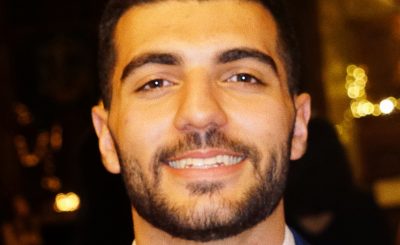Elie Rizk fears the reconstruction of Beirut from Tuesday’s massive explosion in Lebanon’s capital city will be beyond his country’s capabilities.
“Lebanon is experiencing its worst economic crisis,” said Rizk, a 2020 graduate of the United World College-USA, who left his home in Beirut for two years to study at the international high school in Montezuma.
The explosion left at least 135 dead and 5,000 wounded. Hundreds have been reported missing, raising fears that the death toll will rise, Lebanon’s Health minister said Wednesday.
“Before the explosion, almost half of the population lived below the poverty line as the value of the Lebanese Lira lost 80 percent of its value, (in addition to high) unemployment, and the COVID-19 lockdown,” Rizk said.
“After the explosion, I believe those numbers will skyrocket as more than 250,000 people were displaced from their homes and (there was) more than $5 billion in damage,” he added. “On Aug. 4, we simply paid the price of having incompetent, corrupt, and criminal leaders in charge of our beautiful country.”
The investigation is focusing on an estimated 2,750 metric tons of the explosive ammonium nitrate stored at a warehouse, according to published reports. Authorities say it was stored on a Russian vessel in the port of Beirut since 2013 without safety precautions despite warnings by local officials.
“Documents published online show that Lebanese officials knew of the danger posed by having those chemicals at the Beirut port six years ago,” said Rizk. “The issue here is that the Lebanese authorities kept explosives in the heart of Beirut for six years. The issue is not how they blew up.”
At the time of the explosion, Rizk was visiting a friend about 10 miles north of Beirut. They heard a loud boom and thought it was an earthquake.
“We tried to open news sources on our phones, but the Internet stopped working,” he said. “The TV channels were not covering (it) yet. We were very lost! We both thought it was an Israeli aircraft flying over Lebanon.”
They soon learned the explosion came from Beirut, a city of 2.4 million.
“We never imagined that such a catastrophe could happen in our capital,” said Rizk, who plans to double major in economics and data science at Macalester College in St. Paul, Minn. “It is a tragedy. I am still in shock. The sound of the explosion is still in my head and will probably always be.”
He said the detonation sent shockwaves through Beirut, destroying much of it.
“The explosion was the equivalent of a 3.5 magnitude earthquake or 3 kilotons of TNT,” Rizk said. “Analysts compared it to the Hiroshima bomb that was 15 kilotons.”
The disaster killed a young lady from his hometown while two of his family members were wounded from broken glass as the explosion blew out windows for miles away; one of those family members lost their home.
The number of messages Rizk received from friends and teachers at UWC has been heartwarming.
“I thank every one of them for checking on me,” he said. “I thank them for caring about my country, Lebanon, and I invite them to join the Lebanese in rebuilding Beirut by donating to the local NGOs such as Lebanese Red Cross or by simply exposing our corrupt regime.”

